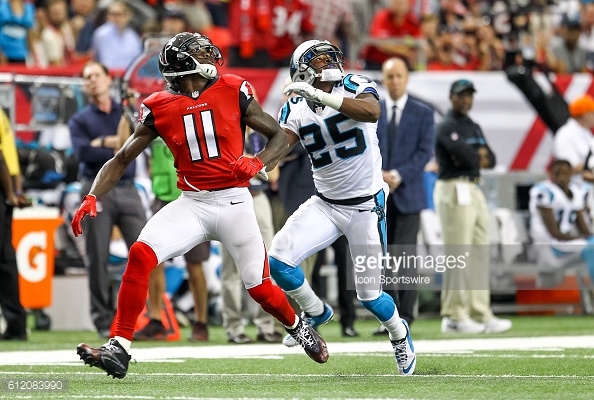Earlier this week, the Los Angeles Rams adopted the Pittsburgh Steelers’ approach to Antonio Brown early in his career by giving running back Todd Gurley a long-term extension two years earlier than they needed to. Just last night, the Atlanta Falcons adopted another approach the Steelers used to appease their wide receiver, forwarding future money into the current season for All-Pro Julio Jones.
Jones, who signed a long-term extension after four seasons in the league on a five-year deal that included $14.25 million in new money annually, had the second-largest wide receiver contract in the league at the time behind only Calvin Johnson, who would retire after the 2015 season.
Since the eighth-year man signed that contract four offseasons ago, however, a staggering eight players at his position have signed new deals that earn them a larger per-year output. Brown is at the top of the list with $17 million per year, a deal that he signed last offseason.
Following Brown in average annual salary between himself and Jones are Mike Evans ($16.5), DeAndre Hopkins ($16.2), Brandin Cooks ($16.2), Sammy Watkins ($16), Jarvis Landry ($15.1), A.J. Green ($15), and Davante Adams ($14.5). Only a few of those could even entertain an argument about being the Falcons receiver’s equal on the field.
Of course, that is what tends to happen when you sign a new contract in an era in which the salary cap rapidly increases on a perennial basis and you are not clearly heads-and-shoulders above your peers, the way that Johnson was at his height when he signed what was at the time the largest contract for a wide receiver in NFL history.
The problem for Jones is that he wants more money, but he has three years left on his contract. Sound familiar? That’s the same boat the Steelers were in with Brown in 2015. Their solution was to forward him money for the next two years on his deal into the 2015 and 2016 seasons in order to pay him more while sticking to their policy not to technically renegotiate contracts with players other than franchise quarterbacks with more than one year left on their deals.
So why did it become so important for the Falcons to address Jones’ contract right now? Well, because he chose to hold out. He did not report to training camp, and the belief is that he would have been willing to sit out the entirety of camp in order to get his point across.
The Falcons reportedly did the exact same thing for Jones that the Steelers did for Brown: they moved $2 million from hi 2019 salary into 2018. They may move $4 million of his 2020 to 2019 next year (to make up for the removed $2 million, plus an additional $2 million), as was the case with Brown. According to Ian Rapoport, the move is “cap-neutral”, so it also likely entails moving a portion of his salary into a signing bonus that would prorate over the final three years of his contract.
For what it’s worth, General Manager Thomas Dimitroff said that “we will re-address everything in 2019”, which is a different tactic than the Steelers used. Pittsburgh made Brown play out two more years of his contract. Atlanta sounds as though it is preparing to offer Jones an extension with two years left on his contract.








